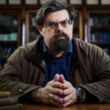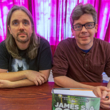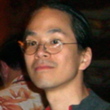The Dark Forest
(Libby/OverDrive eAudiobook)
Available Platforms
Description
The inspiration for the Netflix series 3 Body Problem!Over 1 million copies of the Three-Body Problem series sold in North AmericaPRAISE FOR THE THREE-BODY PROBLEM SERIES: “A mind-bending epic.”—The New York Times • “War of the Worlds for the 21st century.”—The Wall Street Journal • “Fascinating.”—TIME • “Extraordinary.”—The New Yorker • “Wildly imaginative.”—Barack Obama • “Provocative.”—Slate • “A breakthrough book.”—George R. R. Martin • “Impossible to put down.”—GQ • “Absolutely mind-unfolding.”—NPR • “You should be reading Liu Cixin.”—The Washington PostThe Dark Forest is the second novel in the groundbreaking, Hugo Award-winning series from China's most beloved science fiction author, Cixin Liu.In The Dark Forest, Earth is reeling from the revelation of a coming alien invasion-in just four centuries' time. The aliens' human collaborators may have been defeated, but the presence of the sophons, the subatomic particles that allow Trisolaris instant access to all human information, means that Earth's defense plans are totally exposed to the enemy. Only the human mind remains a secret. This is the motivation for the Wallfacer Project, a daring plan that grants four men enormous resources to design secret strategies, hidden through deceit and misdirection from Earth and Trisolaris alike. Three of the Wallfacers are influential statesmen and scientists, but the fourth is a total unknown. Luo Ji, an unambitious Chinese astronomer and sociologist, is baffled by his new status. All he knows is that he's the one Wallfacer that Trisolaris wants dead.The Three-Body Problem SeriesThe Three-Body ProblemThe Dark ForestDeath's EndOther Books by Cixin LiuBall Lightning Supernova EraTo Hold Up the SkyThe Wandering EarthA View from the Stars
More Details
Excerpt
Similar Series From Novelist
Similar Titles From NoveList
Similar Authors From NoveList
Published Reviews
Booklist Review
In 2014, Chinese star author Cixin Liu's The Three Body Problem came to the Western world with a fresh coat of English and a smartly imaginative and surreal first-contact story to tell. Now its sequel continues the tale of international alien intrigue as the extraterrestrial Trisolarans, a telepathic race incapable of deception, attempt to understand humanity, which knows deception to be its only advantage should the visitors turn out to be hostile. With this central conceit, Liu proves that The Three Body Problem only showcased a portion of his delightfully and powerfully clever imagination. The book's large cast of characters form a latticework of precisely placed focal points around which the story weaves and connects to wonderful moments of revelation. Readers of the prequel may feel the lack of extended, surrealistically dream-like scenes, and all readers will likely note this new installment's rather graceless exposition-dumps for uninformed newcomers to the series, but the macroscopic power of Liu's writing assures that The Dark Forest is worthy of its predecessor.--Francis, Chris Copyright 2015 Booklist
Publisher's Weekly Review
Readers who haven't read (or haven't recently reread) 2014's The Three-Body Problem will feel disoriented at the outset of this sprawling hard SF novel. In the prologue, an ant and a spider overhear Dr. Ye Wenjie, an astrophysicist, suggest to astronomer-turned-sociologist Luo Ji that there are "axioms of cosmic civilization," a neat variation on Asimov's psychohistory. This scene epitomizes the book's biggest flaw: clever ideas lost in often didactic prose. Before the notion of a cosmic sociology can be further developed, Liu shifts gears to present a dialogue between an alien intelligence, the Trisolaris, and the leader of the Earth-Trisolaris Organization, about the distinction between thought and speech. The Trisolarians pose a significant threat to humankind, which triggers very different responses on Earth, ranging from the Escapists, who believe that flight is the only option, to the formation of a Planetary Defense Council. The upbeat ending sets up the concluding volume, but not everyone will have the patience needed to get that far. (Aug.) © Copyright PWxyz, LLC. All rights reserved.
Kirkus Book Review
Second part of an alien-contact trilogy (The Three-Body Problem, 2014) from China's most celebrated science-fiction author. In the previous book, the inhabitants of Trisolaris, a planet with three suns, discovered that their planet was doomed and that Earth offered a suitable refuge. So, determined to capture Earth and exterminate humanity, the Trisolarans embarked on a 400-year-long interstellar voyage and also sent sophons (enormously sophisticated computers constructed inside the curled-up dimensions of fundamental particles) to spy on humanity and impose an unbreakable block on scientific advance. On Earth, the Earth-Trisolaris Organization formed to help the invaders, despite knowing the inevitable outcome. Humanity's lone advantage is that Trisolarans are incapable of lying or dissimulation and so cannot understand deceit or subterfuge. This time, with the Trisolarans a few years into their voyage, physicist Ye Wenjie (whose reminiscences drove much of the action in the last book) visits astronomer-turned-sociologist Luo Ji, urging him to develop her ideas on cosmic sociology. The Planetary Defense Council, meanwhile, in order to combat the powerful escapist movement (they want to build starships and flee so that at least some humans will survive), announces the Wallfacer Project. Four selected individuals will be accorded the power to command any resource in order to develop plans to defend Earth, while the details will remain hidden in the thoughts of each Wallfacer, where even the sophons can't reach. To combat this, the ETO creates Wallbreakers, dedicated to deducing and thwarting the plans of the Wallfacers. The chosen Wallfacers are soldier Frederick Tyler, diplomat Manuel Rey Diaz, neuroscientist Bill Hines, andLuo Ji. Luo has no idea why he was chosen, but, nonetheless, the Trisolarans seem determined to kill him. The plot's development centers on Liu's dark and rather gloomy but highly persuasive philosophy, with dazzling ideas and an unsettling, nonlinear, almost nonnarrative structure that demands patience but offers huge rewards. Once again, a highly impressive must-read. Copyright Kirkus Reviews, used with permission.
Booklist Reviews
In 2014, Chinese star author Cixin Liu's The Three Body Problem came to the Western world with a fresh coat of English and a smartly imaginative and surreal first-contact story to tell. Now its sequel continues the tale of international alien intrigue as the extraterrestrial Trisolarans, a telepathic race incapable of deception, attempt to understand humanity, which knows deception to be its only advantage should the visitors turn out to be hostile. With this central conceit, Liu proves that The Three Body Problem only showcased a portion of his delightfully and powerfully clever imagination. The book's large cast of characters form a latticework of precisely placed focal points around which the story weaves and connects to wonderful moments of revelation. Readers of the prequel may feel the lack of extended, surrealistically dream-like scenes, and all readers will likely note this new installment's rather graceless exposition-dumps for uninformed newcomers to the series, but the macroscopic power of Liu's writing assures that The Dark Forest is worthy of its predecessor. Copyright 2014 Booklist Reviews.
Publishers Weekly Reviews
Readers who haven't read (or haven't recently reread) 2014's The Three-Body Problem will feel disoriented at the outset of this sprawling hard SF novel. In the prologue, an ant and a spider overhear Dr. Ye Wenjie, an astrophysicist, suggest to astronomer-turned-sociologist Luo Ji that there are "axioms of cosmic civilization," a neat variation on Asimov's psychohistory. This scene epitomizes the book's biggest flaw: clever ideas lost in often didactic prose. Before the notion of a cosmic sociology can be further developed, Liu shifts gears to present a dialogue between an alien intelligence, the Trisolaris, and the leader of the Earth-Trisolaris Organization, about the distinction between thought and speech. The Trisolarians pose a significant threat to humankind, which triggers very different responses on Earth, ranging from the Escapists, who believe that flight is the only option, to the formation of a Planetary Defense Council. The upbeat ending sets up the concluding volume, but not everyone will have the patience needed to get that far. (Aug.)
[Page ]. Copyright 2015 PWxyz LLCReviews from GoodReads
Citations
Liu, C., Ochlan, P. J., & Martinsen, J. (2015). The Dark Forest (Unabridged). Macmillan Audio.
Chicago / Turabian - Author Date Citation, 17th Edition (style guide)Liu, Cixin, P. J. Ochlan and Joel Martinsen. 2015. The Dark Forest. Macmillan Audio.
Chicago / Turabian - Humanities (Notes and Bibliography) Citation, 17th Edition (style guide)Liu, Cixin, P. J. Ochlan and Joel Martinsen. The Dark Forest Macmillan Audio, 2015.
Harvard Citation (style guide)Liu, C., Ochlan, P. J. and Martinsen, J. (2015). The dark forest. Unabridged Macmillan Audio.
MLA Citation, 9th Edition (style guide)Liu, Cixin, P. J Ochlan, and Joel Martinsen. The Dark Forest Unabridged, Macmillan Audio, 2015.
Copy Details
| Collection | Owned | Available | Number of Holds |
|---|---|---|---|
| Libby | 7 | 0 | 11 |







































